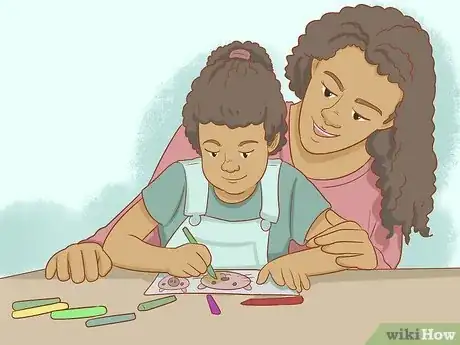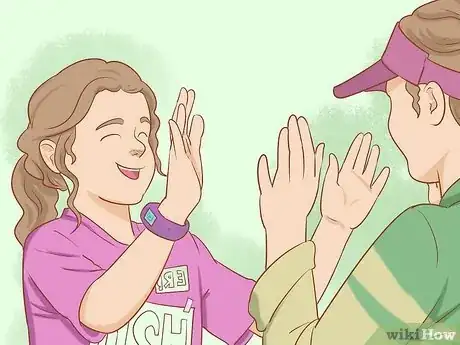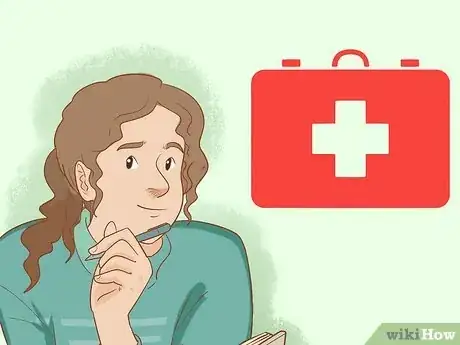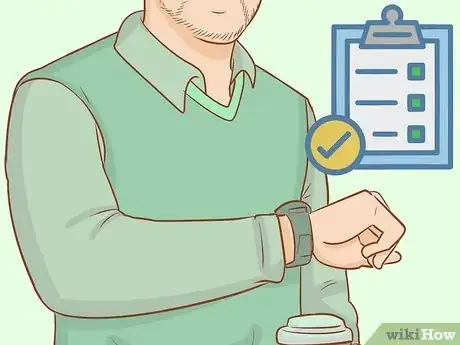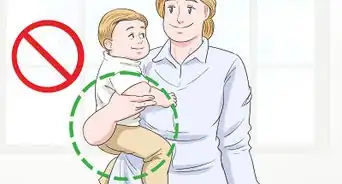This article was co-authored by Denise Stern. Denise Stern is a Parenting Specialist and the CEO of Let Mommy Sleep, the country’s leading Baby Nurse and Postpartum Care service. Denise specializes in providing nurturing care to newborns and evidence-based education to their parents. She holds a BA in Public Relations from North Carolina State University. Denise was the US Chamber of Commerce Leading Woman-Owned Business in 2013, a Washington FAMILY Magazine Mother of the Year in 2016, and on the elite White House Summit for Working Families hosted by the President and First Lady Obama in 2014. Let Mommy Sleep is the only company of its kind that holds a local government contract to teach newborn and postpartum care.
There are 13 references cited in this article, which can be found at the bottom of the page.
This article has been viewed 40,795 times.
An au pair is a young adult from a foreign country who travels to the United States (or other foreign countries) to assist a family with childcare and more. An au pair works about 45 hours a week in exchange for the opportunity to live abroad with a family for a year. While the majority of an au pair's responsibility involves caring for children, they can also be responsible for a variety of tasks pertaining to family life.[1]
Steps
Learning How to Care for Children
-
1Gain babysitting experience. If you want to be an au pair, parents have to be able to trust you with the well-being of their children. You can achieve this by ensuring that you have plenty of experience with babysitting or caring for children of various ages. Try caring for family members, neighbors' children, or get a job at a local daycare center. The more experience you have with children, the more comfortable parents will be with you.
- Once you have made up your mind to babysit, spread the word. Let family members and neighbors know, post an ad on community boards at the library or pediatrician's office, or try online sites like Care.com.[2]
- As you gain experience, try to add more qualifications to your resume such as CPR or first aid training. Also, try to add more responsibilities like picking children up from school or tutoring.[3]
-
2Learn how to engage children. Being an au pair goes beyond supervising children; you must also learn how to connect to the children by keeping them entertained. Use your creativity to find activities that allow you to interact with the children in a playful and fun manner.[4]
- Determine the age of the child or children in order to ensure the activities will be entertaining and engaging.
- Come up with creative games, activities, or craft projects. For example, instead of turning on the television try sidewalk chalk games, creating a toddler drawing box, or taking a trip to the park.
- You can even try setting up playdates with other au pairs and children to keep your kids entertained while having a social group for yourself. Your coordinator can assist in locating other au pairs in your area.
Advertisement -
3Learn how to effectively discipline children. Children are not perfect; they will misbehave, test limits, and sometimes push you to your limits. The important thing to remember is to respond to their misbehavior as an adult—and not as their parent. Avoid yelling, arguing, or inflicting any type of physical punishment.[5] Always keep in mind that you are an adult, and they are a child.
- Remember that parents set the rules and expectations for children. Make sure you fully understand the host parents' rules and follow them closely to avoid confusion.
- Always communicate your expectations with children and reiterate your expectations after misbehavior.[6]
- Try modeling good behavior so children can imitate and follow your lead.
- Communicate incidents to parents. Remember you are the “eyes and ears” for the parents. Be sure to share your concerns with parents. Not only will they discuss expectations with the children but they can also give you tips about how to handle behavioral problems.[7]
-
4Get first-aid training. Being prepared to face the worst is a skill that all au pairs need. CPR and first aid courses will teach you the skills needed to treat cuts and wounds, assist with victims of choking or drowning, and treat sudden onsets of illness. Determine the level of training needed and contact a training center in your area for more information.
- Courses include 30-minute “citizen” CPR courses, full first aid courses, or full on CPR and AED (Automated External Defibrillator) courses. Determine your need before signing up for a class.[8]
- Classes are offered both online and in-person and can range from 30 minutes to 3 hours.[9]
- Visit sites like the American Red Cross, the American Heart Association and the National Safety Council for information about how to register for a class.
-
5Be sensitive to the children. Always be loving to the children whether you are working or not.[10] Being lovable will bring out happiness in the children and allow them to bond with you easier.
- Be involved in their lives by taking an interest in their interests. Show them how important they are to you.[11]
- Tell them that you care for them. Though it sound obvious, don't be afraid to tell them how important they are in your life and to show it through physical contact like hugs.[12]
- Really listen to them. Make eye contact and engage them in conversation in order to make them feel important and cared for.[13]
- Remember that parents always come first to children. While building your relationship with the children, try not to compete with parents for their time and attention.
Learning How to Manage a Home
-
1Learn how to clean thoroughly. Although not compulsory, you will almost definitely be expected to help with housework in your new home. Make sure you're fine with doing laundry, making beds, washing dishes, vacuuming and dusting, and cleaning bathrooms.
- Prepare for your cleaning duties by making sure your current dwelling is kept tidy. Become familiar with cleaning devices such as dishwashers, vacuums, and washers and dryers.
- Some au pairs are only responsible for light housework that involves the children such as doing their laundry, keeping their rooms tidy, or picking up their toys.[14]
-
2Prepare kid-friendly meals. While most au pairs aren't required to prepare full course meals, they are usually asked to cook small meals and snacks for children. Be sure that you are capable of packing school lunches, preparing snacks, and cleaning up after mealtime.[15]
- Always be aware of cultural differences in the types of foods consumed as well as the time of day meals are eaten.
- Try searching for and practicing kid friendly recipes that suit the tastes of the children. You can also make an activity of it by involving the children in the cooking process.[16]
-
3Take driving lessons. Some au pairs are required to chauffeur children to and from various destinations. For example, some are required to take children to school, to sports practice, to doctor's appointments, or to daily outings.[17] Learning to drive (specifically in the state where you'll be residing) is a crucial step in becoming a good au pair.
- You can learn to drive through online driving schools that allow you to take courses online at your own pace. Most require both classroom and behind the wheel training.[18]
- You can also go to DMV.org to check out the requirements needed for each state in the U.S., and to find additional resources for driver's education programs.
-
4Learn to run errands. Some au pairs are responsible for running errands that pertain to the children and the household. Common tasks include grocery shopping, dropping off or picking up dry cleaning, or driving the children around. Be prepared to assist your family with various chores and always keep a helpful attitude.
- Remember to never say “that's not my job” to your host parents. If you feel like your host parents are asking you to do more than what is outlined in your contract, contact your coordinator.[19]
Being Professional
-
1Show respect. Always be polite and mindful of both your family and their property. Say “please” and “thank you,” listen to their directives, and be considerate of their time and feelings. Be sure to keep their property clean including the car, your room, and shared space.[20]
- It's also important to be aware of cultural differences and to learn to respect them. For example, words like “stupid” or “hate” have a strong emotional appeal in the United States and you should avoid using them in a professional setting.[21]
-
2Be punctual. Always be on time (better yet early) to any event. Whether it is arriving to work, picking up the children, arriving at appointments, or putting kids to bed, deadlines should be strictly adhered to. Failing to do so can cause a loss of trust from the host parents.[22]
- Keep a planner and know your schedule ahead of time so you know exactly what time you have to leave one spot in order to arrive at your next destination on time.
- Instead of leaving “on time,” always leave early so you have some wiggle room for the unexpected.
-
3Be well-organized. Parents often request the services of au pairs because their family life is hectic. The job of an au pair is to make the host parents' lives easier by being on top of various events and appointments. Be sure to use a planner such as a cellphone or appointment book to keep track of all appointment dates and times.
-
4Have strong communication skills. Know how to communicate with both the children and the host parents. Always feel comfortable with sharing thoughts and concerns in a non-threatening or vulgar manner.
- If you feel it may be a difficult conversation, think about what you will say before you say it. It may be helpful to write it out or make notes ahead of time.[25]
- Communication is a two-way street so don't forget to listen. Try to hear what your family is saying and take it into consideration before acting.[26]
- Contact your coordinator if you need tips on how to communicate with your host family.[27]
-
5Be mindful of your behavior during your personal time. Au pairs typically work anywhere from 30-45 hours a week with the remaining time being personal or "free" time. Time off is usually structured as one off day a week, one additional off day a month, and free time on certain holidays.[28] During your free time, remember that you are a guest within the home, and a representation of the family in public. Always be on your best behavior.
- Some au pairs can get coerced into working even on their off days. If you ever feel as if your off time is not being respected, talk to your host family or contact your coordinator for assistance.
Community Q&A
-
QuestionDo I need to be a girl to become an au pair?
 Community AnswerNo, anyone can become an au pair regardless of what gender they are.
Community AnswerNo, anyone can become an au pair regardless of what gender they are.
Warnings
- Respect cultural differences by abiding by the golden rule: treat others how you would want to be treated.⧼thumbs_response⧽
- Contact your coordinator for assistance if you ever feel that your host family is asking you to complete tasks that are not within your contract.⧼thumbs_response⧽
Expert Interview
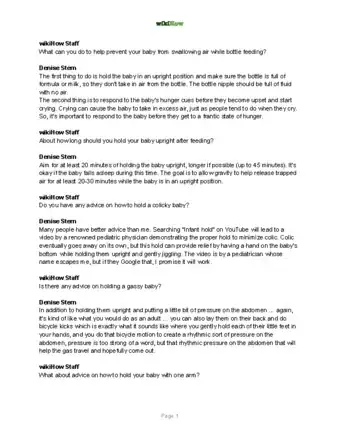
Thanks for reading our article! If you'd like to learn more about au pairs, check out our in-depth interview with Denise Stern.
References
- ↑ https://www.aupaircare.com/host-families/program-overview
- ↑ https://www.care.com/a/how-to-get-a-teen-babysitting-job-1303250846
- ↑ https://www.care.com/a/how-to-get-a-teen-babysitting-job-1303250846
- ↑ https://mchazen.aupairnews.com/tips-for-au-pairs/
- ↑ https://mchazen.aupairnews.com/tips-for-au-pairs/
- ↑ https://www.quora.com/Whats-the-best-way-to-discipline-children-that-are-not-yours
- ↑ https://mchazen.aupairnews.com/tips-for-au-pairs/
- ↑ https://www.care.com/a/how-to-get-first-aid-and-cpr-training-1302270533
- ↑ http://www.icpri.com/frequently-asked-questions
- ↑ https://mchazen.aupairnews.com/tips-for-au-pairs/
- ↑ http://articles.philly.com/2004-08-02/news/25391687_1_effective-parenting-laurence-steinberg-psychological-adjustment
- ↑ https://www.positivelypositive.com/2012/03/18/show-your-kids-you-love-them/
- ↑ https://www.positivelypositive.com/2012/03/18/show-your-kids-you-love-them/
- ↑ https://www.aupaircare.com/host-families/program-overview
- ↑ https://www.aupaircare.com/host-families/program-overview
- ↑ http://www.spatulatta.com/
- ↑ https://www.aupaircare.com/host-families/program-overview
- ↑ http://teendriving.com/driving-tips/getting-started/
- ↑ https://mchazen.aupairnews.com/tips-for-au-pairs/
- ↑ https://mchazen.aupairnews.com/tips-for-au-pairs/
- ↑ https://mchazen.aupairnews.com/tips-for-au-pairs/
- ↑ https://mchazen.aupairnews.com/tips-for-au-pairs/
- ↑ http://zenhabits.net/27-great-tips-to-keep-your-life-organized/
- ↑ https://mchazen.aupairnews.com/tips-for-au-pairs/
- ↑ http://www.loveisrespect.org/healthy-relationships/communicate-better/
- ↑ http://www.loveisrespect.org/healthy-relationships/communicate-better/
- ↑ https://mchazen.aupairnews.com/tips-for-au-pairs/
- ↑ https://www.aupairworld.com/en/tos/au-pair-regulations
